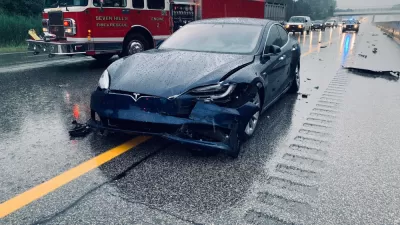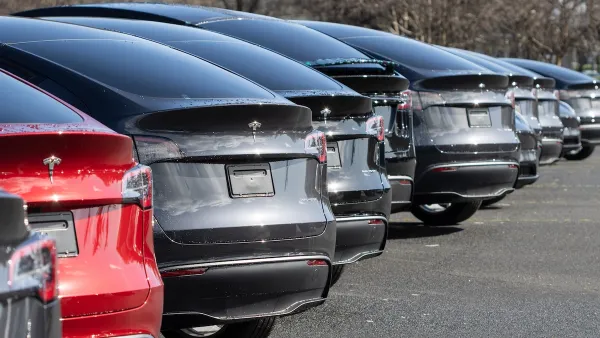Federal regulators are asking the carmaker to update the software on vehicles equipped with FSD due to its poor safety record.

Months after California banned Tesla from using the term ‘full self-driving’ or FSD, citing safety concerns, the National Highway Traffic Safety Administration (NHTSA) directed the company to recall 362,758 vehicles equipped with the software. Richard Lawler reports on the story for The Verge.
Documents filed regarding the recall (included below) don’t call out specific incidents, but NHTSA’s concerns are listed as focusing on four specific situations that can happen on the road, like navigating intersections during a “stale” yellow light, how long cars stop at a stop sign when the intersection is clear, how they adjust speed while driving in areas where the speed limit is changing based on road signs the car detects and settings put in place by the driver, and how the cars change lanes to get out of a turn-only lane.
While FSD requires the driver to “stay fully engaged” in its operation, “FSD-equipped Tesla vehicles will speed up and slow down on their own, make turns — including unprotected left turns, which are extremely difficult for automated systems — and recognizes traffic signals and other road signs.”
Tesla says it will implement a software update to address the NHTSA’s concerns, which won’t require car owners to bring the cars to a dealership. In addition to the recall, “NHTSA has been investigating Tesla’s driver-assist technology for several years, focusing specifically over a dozen incidents in which Tesla vehicles equipped with Autopilot crashed into stationary emergency vehicles. That investigation is much more expansive, covering up to 830,000 vehicles.”
FULL STORY: Tesla recalls 362,758 vehicles equipped with Full Self-Driving beta for ‘crash risk’

Planetizen Federal Action Tracker
A weekly monitor of how Trump’s orders and actions are impacting planners and planning in America.

Maui's Vacation Rental Debate Turns Ugly
Verbal attacks, misinformation campaigns and fistfights plague a high-stakes debate to convert thousands of vacation rentals into long-term housing.

Restaurant Patios Were a Pandemic Win — Why Were They so Hard to Keep?
Social distancing requirements and changes in travel patterns prompted cities to pilot new uses for street and sidewalk space. Then it got complicated.

In California Battle of Housing vs. Environment, Housing Just Won
A new state law significantly limits the power of CEQA, an environmental review law that served as a powerful tool for blocking new development.

Boulder Eliminates Parking Minimums Citywide
Officials estimate the cost of building a single underground parking space at up to $100,000.

Orange County, Florida Adopts Largest US “Sprawl Repair” Code
The ‘Orange Code’ seeks to rectify decades of sprawl-inducing, car-oriented development.
Urban Design for Planners 1: Software Tools
This six-course series explores essential urban design concepts using open source software and equips planners with the tools they need to participate fully in the urban design process.
Planning for Universal Design
Learn the tools for implementing Universal Design in planning regulations.
Heyer Gruel & Associates PA
JM Goldson LLC
Custer County Colorado
City of Camden Redevelopment Agency
City of Astoria
Transportation Research & Education Center (TREC) at Portland State University
Jefferson Parish Government
Camden Redevelopment Agency
City of Claremont





























